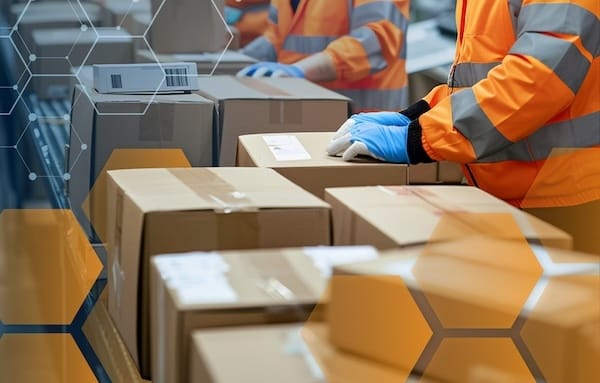- Warehouse Wisdom. Weekly.
- Posts
- Warehouse Wisdom. Weekly. 04/04/2025
Warehouse Wisdom. Weekly. 04/04/2025
Only the most relevant news for SMBs to improve logistics – picked, packed, and delivered without the bias.

Happy Friday!
Okay, so we’re starting out this week with some good news. For one, you can finally make an omelet without needing to consult your financial advisor—egg shortages are easing, and the USDA says shelves are now fully stocked. Scrambled eggs for everyone (terms and conditions may apply). Meanwhile, over in retail land, the National Retail Federation is projecting at least $5.42 trillion in sales for 2025, because “economic queasiness” is just a vibe, not a sales deterrent.
In this week’s newsletter, we’ll get into all the latest: Liberation Day (not just a catchy name), the actual end of de minimis (for real this time?), a rebrand for SurePost, proposed tax relief for truck drivers, and more news from the wild world of freight, warehousing, and logistics. Let’s dive in…
Global Logistics
A de minimis conclusion and a guacamole dilemma

The White House officially closed the de minimis loophole this week, marking the end of an era for e-commerce’s favorite trade workaround. The administration framed the move as a measure to combat China’s role in the opioid crisis, though the retail sector may be equally concerned about what this means for two-day shipping and $12 handbags that magically arrive from Shenzhen.
In case you’re living under a rock, President Trump announced a new baseline 10% tariff across the board. The details by country, including China, Japan, the EU, Vietnam, and everyone else are detailed, and the strategic planning begins. Countries didn’t waste any time responding, of course. China hinted at “appropriate countermeasures,” which feels ominous in a diplomatic way. The EU called the tariffs “unjustified,” and Japan said “regrettable.”
But necessity is the mother of reinvention, and U.S. companies are already demonstrating Olympic-level agility in tariff-proofing their operations. Whether it's creating a backup plan for guacamole, reclassifying goods, or reinventing product specs just enough to dodge the fine print, the entrepreneurial spirit lives on and the legal team on speed dial.
Meanwhile, China is taking a long, hard look at BlackRock’s $3.5 billion Panama Canal port deal. And Panama itself could throw a wrench into the acquisition as well.
Finally, to keep the canal-themed news going, Maersk announced it is buying the Panama Canal Railway. If you can’t beat the bottleneck, buy the rails next to it. It's a move that signals growing interest in controlling alternative logistics corridors, especially as water levels—and political patience—fluctuate.
Apple's New Smart Display Confirms What This Startup Knew All Along
Apple has entered the smart home race with its new Smart Display, firing a $158B signal that connected homes are the future.
When Apple moves in, it doesn’t just join the market — it transforms it.
One company has been quietly preparing for this moment.
Their smart shade technology already works across every major platform, perfectly positioned to capture the wave of new consumers Apple will bring.
While others scramble to catch up, this startup is already shifting production from China to its new facility in the Philippines — built for speed and ready to meet surging demand as Apple’s marketing machine drives mass adoption.
With 200% year-over-year growth and distribution in over 120 Best Buy locations, this company isn’t just ready for Apple’s push — they’re set to thrive from it.
Shares in this tech company are open at just $1.90.
Apple’s move is accelerating the entire sector. Don’t miss this window.
Past performance is not indicative of future results. Email may contain forward-looking statements. See US Offering for details. Informational purposes only.
Small Parcel Shipping
New names, same routes

The USPS is rolling out new service standards. Rural deliveries might be negatively impacted, but other delivery times could improve – and cost savings should begin to accelerate.
Meanwhile, UPS has decided that "SurePost" just didn’t sound confident enough, so it’s rebranding the service as "Ground Saver." It’s the same last-mile handoff to USPS, just with a name that makes it sound like a budget hero rather than a corporate compromise. Whether this changes customer perception or just confuses your returns department remains to be seen, but hey, it’s not the worst thing to be called in logistics.
Logistics Vitals
Typical Amazon shoppers are on a first name basis with delivery drivers

Recent data reveals that the typical Amazon shopper is a frequent and loyal customer, contributing significantly to the platform's sales. Key statistics include:
Annual Spending: The average Amazon customer spent $2,817 on the platform last year.
Purchase Frequency: This spending was spread across 73 separate purchases throughout the year.
Repeat Purchase Rate: Amazon boasts a 99% repeat purchase rate among its customers.
Demographics: Most Amazon shoppers are female (75%), white (66%), and 69% are homeowners.
Income Levels: 48% of Amazon shoppers fall within the middle-income range ($40K-$125K), while 29% are in the high-income bracket ($125K-plus).
Logistics Jobs
Tax credits and pink slips

To address the ongoing truck driver retention challenges, Rep. Zach Nunn has reintroduced the Strengthening Supply Chains Through Truck Driver Incentives Act. This legislation proposes a refundable tax credit of up to $7,500 for current truckers logging at least 1,900 hours annually, and up to $10,000 for new drivers or those enrolled in apprenticeship programs. The bill aims to enhance recruitment and retention in the trucking industry, despite studies suggesting that issues like low pay and challenging working conditions are the primary factors affecting driver turnover.
Meanwhile, the freight industry continues to experience turbulence, with the first quarter concluding with announcements of nearly 23,000 job cuts across sectors including automotive, food distribution, and manufacturing. This trend underscores the persistent challenges within the supply chain and raises questions about the stability of freight-related employment in the current economic landscape.
Marketplaces
Amazon eyes TikTok in the final hour

In a plot twist no one saw coming, Amazon has reportedly submitted a last-minute bid to acquire TikTok's U.S. operations, just as the platform faces an impending ban scheduled for Saturday. This eleventh-hour maneuver places Amazon among a roster of potential buyers, all vying to rescue TikTok from its current predicament. The urgency stems from a law requiring TikTok's parent company, ByteDance, to divest its U.S. assets due to national security concerns—a mandate that has led to a flurry of high-stakes negotiations and strategic posturing.
In other news, the latest EY Future Consumer Index reveals that inflation and rising costs are prompting dramatic shifts in consumer behavior. Shoppers are becoming more price-conscious, altering their purchasing habits, and reassessing brand loyalties. This evolving landscape presents both challenges and opportunities for retailers and supply chain professionals, who must now navigate a market where consumers are tightening their belts—both figuratively and, perhaps, literally.
Warehouse Quick Deliveries
Drone deliveries and background checks resume
“Consumers aren't just buying names anymore – they're buying value, quality, purpose and performance.”

